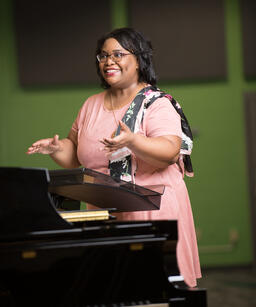The power of the choral art is its ability to communicate relevant, transformative, and meaningful texts while cultivating a diverse musical community. Particularly significant is the exploration of various cultures and musical genres through the performance process. As a choral music educator, ensuring that students embrace a philosophy of diversity, equity, and access is essential. I strive to foster an environment of creativity that will empower students to become master conductor-teachers, skilled in choral pedagogy, and effective as instructors with any level of vocal ensemble.
Felicia Barber
The power of the choral art is its ability to communicate relevant, transformative, and meaningful texts while cultivating a diverse musical community. Particularly significant is the exploration of various cultures and musical genres through the performance process. As a choral music educator, ensuring that students embrace a philosophy of diversity, equity, and access is essential. I strive to foster an environment of creativity that will empower students to become master conductor-teachers, skilled in choral pedagogy, and effective as instructors with any level of vocal ensemble.
Dr. Felicia Barber is the Associate Professor, Adjunct, of Choral Conducting at Yale University and conductor of the Yale Camerata. In addition to teaching graduate-level choral conductors and aspiring undergraduate conductors, Dr. Barber is developing a new initiative designed to prepare Yale students to work with young musicians on choral music in both school and church settings. Currently, she teaches courses in conducting, as well as Advanced Choral Pedagogy, and African American Choral Literature. As conductor of the Yale Camerata, Dr. Barber is thrilled to announce that the ensemble was recently honored by their selection as a performing ensemble for the 2026 Eastern Division American Choral Directors Association’s (ACDA) Conference in Providence, RI.
Prior to her appointment at Yale, Dr. Barber served as Associate Professor of Music and Director of Choral Activities at Westfield State University (WSU) in Westfield, MA, where she conducted the Chamber Chorale, University Chorus, and Gospel Choir, as well as taught courses in conducting and choral methods. In addition to her position at WSU, Dr. Barber also served as Choral Lecturer for the summer master’s program at Gordon College for five years. There she taught courses in Choral Conducting and Choral Music Education for the MME degree.
Dr. Barber’s research interests include effective teaching strategies, fostering classroom diversity and incorporating equity and justice initiatives in choral curricula, and the linguistic performance practice of African American spirituals. She has contributed to such periodicals as the American Choral Directors Association’s Choral Journal and is the author of A New Perspective for the Use of Dialect in African American Spirituals: History, Context, and Linguistics (Rowman & Littlefield, 2021).
Additional projects include serving as curator and editor for the Felicia Barber Choral Series, with Hinshaw Music Publications. Dr. Barber’s goal for the series is to promote and amplify music of new BIPOC composers and arrangers. The inaugural piece of the series was published in March of 2025 and is entitled Ren Ri Si Gui by Yiran Zhao. In addition, Dr. Barber’s poetry has recently been featured in a new choral project entitled edication (music composed by Dr. Zanaida Robles), also published by Hinshaw Music. Dr. Barber also served as the conductor for the SATB premiere of Dedication at Eastern Division American Choral Director’s Association (ACDA) High School Honor Choir in 2024 and its Carnegie Hall debut in March of 2025. The SSAA version was also premiered March of 2025 in Dallas as part of ACDA’s National Conference with the SSAA National High School Honor Choir.
An active member of American Choral Directors Association (ACDA), she has presented her research at state, divisional, and national conferences. Dr. Barber has also served the organization on the National Diversity Committee, the Eastern Division 2020 Conference committee, and previously served as the President of the Massachusetts ACDA board. In addition, she is regularly engaged as a guest conductor for youth and community festivals around the country; including several All-State ensembles including Vermont, Oklahoma, California, Louisiana, New Hampshire, North Carolina (Collegiate in ’22 and HS in ’24), Wisconsin, and Rhode Island; and she conducted the ACDA Eastern Division Conference in 2024 and Carnegie Hall Festival in March of 2025.
Barber earned a bachelor of music degree in vocal performance from Oral Roberts University, in Tulsa, OK, where she studied conducting with Dr. Edward Pierce; a master of music degree in choral music education from Mansfield University, in Mansfield, PA, where she studied with Dr. Peggy Dettwiler; and a Ph.D. in music education and choral conducting from Florida State University, where she studied with Dr. André Thomas and completed a dissertation titled Phonological Features Employed in the Text Set by Arrangers of African American Spirituals and an IPA Guide to Proper Pronunciation of Dialect.



